Top Picks
Every day, the stories we cover change our lives. The people we interview inspire us. The events we witness shape our world view. Our front row look at history molds who we are. Below are my top picks.
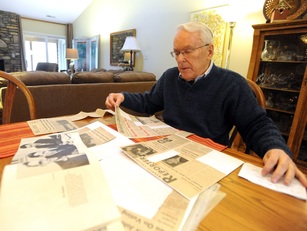
The march in Selma: "Yes I will go," Asheville's Clark Olsen said, Retired minister's role in Civil Rights Movement not to be overlooked
By Beth Walton
Asheville Citizen-Times
Published: Jan. 17, 2015
ASHEVILLE – The Rev. Clark Olsen never made it across the Edmund Pettus Bridge after traveling to Selma, Alabama, to answer Martin Luther King Jr.'s call for clergy to march for African-American voting rights. Yet the retired white minister, who now lives in Asheville, became a critical part of the Civil Rights movement nonetheless after being witness to the murder of James Reeb.
It was March 9, 1965 when Olsen, Reeb and their companion, Orloff Miller, decided to take a shortcut. They were walking on unlit streets to a meeting at Brown Chapel African Methodist Episcopal Church when a mob of four, angry white segregationists moved toward them from across the street. "We were whispering to ourselves to just keep walking," said Olsen, 81, whose hands gripped the armrests of his chair in his Haw Creek home as he recalled the events from nearly 50 years ago.
Reeb and Miller had arrived earlier that day and had received safety instructions to fall in prayer protection position if threatened. "I didn't get those instructions and turned around just in time to see a club at Jim's head," Olsen said. "I heard that awful sound — eventually, we'd find out it cracked his skull — and I ran."...Click here to read the full article text.
By Beth Walton
Asheville Citizen-Times
Published: Jan. 17, 2015
ASHEVILLE – The Rev. Clark Olsen never made it across the Edmund Pettus Bridge after traveling to Selma, Alabama, to answer Martin Luther King Jr.'s call for clergy to march for African-American voting rights. Yet the retired white minister, who now lives in Asheville, became a critical part of the Civil Rights movement nonetheless after being witness to the murder of James Reeb.
It was March 9, 1965 when Olsen, Reeb and their companion, Orloff Miller, decided to take a shortcut. They were walking on unlit streets to a meeting at Brown Chapel African Methodist Episcopal Church when a mob of four, angry white segregationists moved toward them from across the street. "We were whispering to ourselves to just keep walking," said Olsen, 81, whose hands gripped the armrests of his chair in his Haw Creek home as he recalled the events from nearly 50 years ago.
Reeb and Miller had arrived earlier that day and had received safety instructions to fall in prayer protection position if threatened. "I didn't get those instructions and turned around just in time to see a club at Jim's head," Olsen said. "I heard that awful sound — eventually, we'd find out it cracked his skull — and I ran."...Click here to read the full article text.

Battered woman becomes American refugee in Amsterdam: Her husband beat her, so she couldn't let him take custody of their kids
By Beth Walton
City Pages
Published: July 30, 2008
It was the first week of the New Year when Holly Collins showed her identification card to the clerk at City Hall in a small township in western Holland. "Asylum for an unlimited time," it read on the front. On the back: "American Citizen."
"Have you seen this? An American asylum seeker!" the shocked clerk yelled to a colleague across the lobby. Dozens of people milling about the building stopped to listen. The clerk shook her head, and held the card to the light. She couldn't believe it: an American refugee.
"That's how it all started," Holly says over the phone as she sits in her home in a city she asked us not to name. It was 2006, and for the next five months, the mother and children dodged questions as rumors circulated the small village streets. ...Click here for the full article text.
By Beth Walton
City Pages
Published: July 30, 2008
It was the first week of the New Year when Holly Collins showed her identification card to the clerk at City Hall in a small township in western Holland. "Asylum for an unlimited time," it read on the front. On the back: "American Citizen."
"Have you seen this? An American asylum seeker!" the shocked clerk yelled to a colleague across the lobby. Dozens of people milling about the building stopped to listen. The clerk shook her head, and held the card to the light. She couldn't believe it: an American refugee.
"That's how it all started," Holly says over the phone as she sits in her home in a city she asked us not to name. It was 2006, and for the next five months, the mother and children dodged questions as rumors circulated the small village streets. ...Click here for the full article text.

A citizen of nowhere: Uncertain futures for undocumented immigrant youths wanting work and education in the U.S.
By Beth Walton
Asheville Citizen-Times
Published: April 1, 2017
ASHEVILLE – The day Carolina Siliceo Perez – at the age of 15 – discovered she was as an undocumented immigrant living in the United States, she locked herself in her bedroom, threw herself on the bed and sobbed.
Later, before the long road to finishing high school, earning a college degree and finding steady work, she would scream in rage at her mother for hiding her gamble to stay in the U.S. rather than return to Mexico after her migrant visa expired.
Despite those successes and through no fault of her own, Siliceo Perez, now 24, essentially lives as a citizen of nowhere even though she has built a life for herself in Asheville. Should the U.S. take a hard line in changing the way the nation handles illegal immigration, she risks being returned to Mexico, a country where she would have no friends, no job and no place to live. Click here for the full article text.
By Beth Walton
Asheville Citizen-Times
Published: April 1, 2017
ASHEVILLE – The day Carolina Siliceo Perez – at the age of 15 – discovered she was as an undocumented immigrant living in the United States, she locked herself in her bedroom, threw herself on the bed and sobbed.
Later, before the long road to finishing high school, earning a college degree and finding steady work, she would scream in rage at her mother for hiding her gamble to stay in the U.S. rather than return to Mexico after her migrant visa expired.
Despite those successes and through no fault of her own, Siliceo Perez, now 24, essentially lives as a citizen of nowhere even though she has built a life for herself in Asheville. Should the U.S. take a hard line in changing the way the nation handles illegal immigration, she risks being returned to Mexico, a country where she would have no friends, no job and no place to live. Click here for the full article text.

Living transgender: Life beyond the confines of a pronounBy Beth Walton
Asheville Citizen-Times
Published: May 20, 2016
ASHEVILLE - Allison Scott tried to kill herself when she was 10. The Asheville native wrapped a cord from a vacuum cleaner around her neck and choked herself so hard that she passed out.
When her grandmother found her, the embarrassed child lied and said it was an accident. She said she had been playing cowboy and using the cord as an imaginary lasso. No one questioned the story. Scott’s depression, stemming from confusion over her gender identity, was something that wasn’t discussed in the southern home during the mid-1980s.
Though she would often ask her mother why she was born a boy and why the kids bullied her at school, her father encouraged her to “man up.” Despite Scott’s affinity for dressing like a girl when no one was watching, she says her dad made it clear: No son of his was “going to be a faggot.” ...Click here for the full article text.
Asheville Citizen-Times
Published: May 20, 2016
ASHEVILLE - Allison Scott tried to kill herself when she was 10. The Asheville native wrapped a cord from a vacuum cleaner around her neck and choked herself so hard that she passed out.
When her grandmother found her, the embarrassed child lied and said it was an accident. She said she had been playing cowboy and using the cord as an imaginary lasso. No one questioned the story. Scott’s depression, stemming from confusion over her gender identity, was something that wasn’t discussed in the southern home during the mid-1980s.
Though she would often ask her mother why she was born a boy and why the kids bullied her at school, her father encouraged her to “man up.” Despite Scott’s affinity for dressing like a girl when no one was watching, she says her dad made it clear: No son of his was “going to be a faggot.” ...Click here for the full article text.
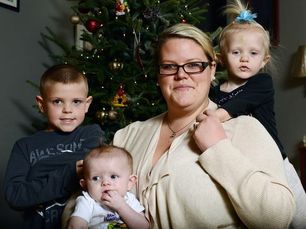
Battling for the right to work while pregnant in NC
By Beth Walton
Asheville Citizen-Times
Published: Jan. 11, 2015
Reprinted in USA Today and other Gannett Company publications
ARDEN – Jamie Cole says she never wanted to leave her job. A certified nursing assistant, Cole provided personal care and services to nursing home residents at Sava Senior Care's Brian Center Health and Rehabilitation in Weaverville for two years. "I loved the residents and I loved my co-workers," she said. "It was my second home."
But that was before a complicated pregnancy put limits on how much she could do, and Sava took her off the work schedule, according to a federal Equal Employment Opportunity Commission complaint filed by Cole. The move eventually forced her to find work elsewhere, she said.
Cole is seeking compensation for economic and emotional damages, wages for time away from work and reimbursement for legal fees. She also wants her case to protect other women who are pregnant and in the workforce. Her case has parallels to one under review by the U.S. Supreme Court. In that case, a UPS worker says she lost her job and health insurance after her doctor told her she should not lift heavy packages.
What is happening to Jamie Cole is happening to women all over the country, said Ariela Migdal, an attorney and senior staff member for the ACLU's Women's Rights Project in New York City. Charges filed with the EEOC and Fair Employment Practices Agencies alleging pregnancy discrimination in the workplace increased by nearly 47 percent from 1997 through 2011, the last year in which states and the federal government reported numbers together. ...Click here for the full article text.
By Beth Walton
Asheville Citizen-Times
Published: Jan. 11, 2015
Reprinted in USA Today and other Gannett Company publications
ARDEN – Jamie Cole says she never wanted to leave her job. A certified nursing assistant, Cole provided personal care and services to nursing home residents at Sava Senior Care's Brian Center Health and Rehabilitation in Weaverville for two years. "I loved the residents and I loved my co-workers," she said. "It was my second home."
But that was before a complicated pregnancy put limits on how much she could do, and Sava took her off the work schedule, according to a federal Equal Employment Opportunity Commission complaint filed by Cole. The move eventually forced her to find work elsewhere, she said.
Cole is seeking compensation for economic and emotional damages, wages for time away from work and reimbursement for legal fees. She also wants her case to protect other women who are pregnant and in the workforce. Her case has parallels to one under review by the U.S. Supreme Court. In that case, a UPS worker says she lost her job and health insurance after her doctor told her she should not lift heavy packages.
What is happening to Jamie Cole is happening to women all over the country, said Ariela Migdal, an attorney and senior staff member for the ACLU's Women's Rights Project in New York City. Charges filed with the EEOC and Fair Employment Practices Agencies alleging pregnancy discrimination in the workplace increased by nearly 47 percent from 1997 through 2011, the last year in which states and the federal government reported numbers together. ...Click here for the full article text.
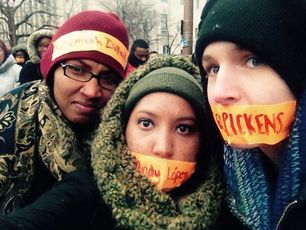
A new wave of activism: Young people fight for justice
By Beth Walton
Asheville Citizen-Times
Published: Feb. 21, 2015
ASHEVILLE – The media cameras have long since gone from the streets of Ferguson, but students from Warren Wilson College are planning a third trip to the Missouri city next month.
Buncombe County Early College students — normally focused on finishing high school with an associate's degree in five years — have organized a trip to Selma, Alabama, to honor the 50th anniversary of Bloody Sunday and passage of the Voting Rights Act.
At Mars Hill University, a contingent traveled five hours to Raleigh last week to march in support of the disenfranchised and the poor. Students formed the first collegiate chapter of the National Association for the Advancement of Colored People at the private Baptist college in 2013.
"This is the movement of the future," said Mckay Sharpe, the white president of the NAACP chapter at Mars Hill. "This is the fight of our generation. This will be something in the history books and I want our students to be a part of that."
"I don't want to be left out or have people around me look back and say, 'Where was I?'" ...Click here to read the full article text.
By Beth Walton
Asheville Citizen-Times
Published: Feb. 21, 2015
ASHEVILLE – The media cameras have long since gone from the streets of Ferguson, but students from Warren Wilson College are planning a third trip to the Missouri city next month.
Buncombe County Early College students — normally focused on finishing high school with an associate's degree in five years — have organized a trip to Selma, Alabama, to honor the 50th anniversary of Bloody Sunday and passage of the Voting Rights Act.
At Mars Hill University, a contingent traveled five hours to Raleigh last week to march in support of the disenfranchised and the poor. Students formed the first collegiate chapter of the National Association for the Advancement of Colored People at the private Baptist college in 2013.
"This is the movement of the future," said Mckay Sharpe, the white president of the NAACP chapter at Mars Hill. "This is the fight of our generation. This will be something in the history books and I want our students to be a part of that."
"I don't want to be left out or have people around me look back and say, 'Where was I?'" ...Click here to read the full article text.

Race and police at Mars Hill University: What happens when a college is more diverse than the town?
By Beth Walton
Asheville Citizen-Times
Published: Dec. 16, 2015
MARS HILL - A week hardly goes by without Alaysia Black Hackett hearing from an African-American student with complaints of mistreatment based on race. And each story, the director of multicultural affairs at Mars Hill University said, brings another little bit of heartache. The black students she works with are struggling to find their place in a town where minorities are few and encounters with law enforcement have left them feeling unsafe, she said.
Hackett said she has no way of verifying the students’ claims. Neither Mars Hill University nor the Mars Hill Police Department catalog complaints or data related to race, even though North Carolina was one of the first states in the nation to mandate that law enforcement track demographic information at traffic stops. Academics, journalists and justice organizations use that information to study racial profiling and look for signs of problems.
Mars Hill doesn’t fall under North Carolina’s law enforcement tracking requirements because of its small size, though the town’s police chief said he plans to start collecting the data anyway. That’s an especially important step at a time when discussion on race, police brutality and campus activism are dominating the news, Hackett said.
“I cannot guarantee that there is huge marginalization here. I cannot guarantee that the numbers will prove what students are saying, but I can say that our conditions are conducive to tragedy if we are not intentional..." Click here for the full article text.
By Beth Walton
Asheville Citizen-Times
Published: Dec. 16, 2015
MARS HILL - A week hardly goes by without Alaysia Black Hackett hearing from an African-American student with complaints of mistreatment based on race. And each story, the director of multicultural affairs at Mars Hill University said, brings another little bit of heartache. The black students she works with are struggling to find their place in a town where minorities are few and encounters with law enforcement have left them feeling unsafe, she said.
Hackett said she has no way of verifying the students’ claims. Neither Mars Hill University nor the Mars Hill Police Department catalog complaints or data related to race, even though North Carolina was one of the first states in the nation to mandate that law enforcement track demographic information at traffic stops. Academics, journalists and justice organizations use that information to study racial profiling and look for signs of problems.
Mars Hill doesn’t fall under North Carolina’s law enforcement tracking requirements because of its small size, though the town’s police chief said he plans to start collecting the data anyway. That’s an especially important step at a time when discussion on race, police brutality and campus activism are dominating the news, Hackett said.
“I cannot guarantee that there is huge marginalization here. I cannot guarantee that the numbers will prove what students are saying, but I can say that our conditions are conducive to tragedy if we are not intentional..." Click here for the full article text.
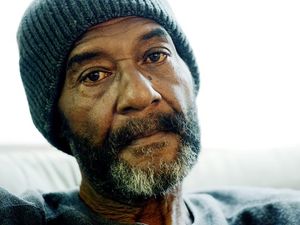
Buncombe close to ending veteran homelessness: Local agencies say that by January no veteran will be forced to live on the streets
By Beth Walton
Asheville Citizen-Times
Published: Nov, 20, 2015
ASHEVILLE - The smell of cornbread wafts through the two-bedroom home off Mullberry Street in Woodfin. Bobby Lewis is making himself dinner. He has pork chops marinating in the refrigerator, baked sweet potatoes in the oven and collard greens on the stove. At 6 feet 5 inches tall, Lewis is a lanky man who speaks emphatically about his faith in Jesus Christ and the misgivings of his past. His wiry arms wave about as he tells the tale of his coming of age. His mother raised seven boys in the small town of Emporia, Virginia. Lewis was the shortest of the lot, he said, with a goofy grin spread across his face.
As he sits in his living room before dinner, the 60-year-old's smile fades when he talks about the Vietnam War and the passing of his wife. He pauses to lean forward and take a drag on his Pall Mall menthol cigarette. As a working class black man in the 1960s and 1970s in an area with few opportunities, Lewis said he felt as if he had two choices. He could stay and try to resist temptations that for many were leading to incarceration. Or he could join the military.
The one-time war protester enlisted with the United States Air Force in 1972, just weeks after he graduated high school. Lewis loaded bombs onto aircraft in Phnom Penh, Cambodia for 18 months. After his tour, he would find stability in his family, but when Lewis' wife died in 2005, he ended up on the streets. ...Click here to read the full article text.
By Beth Walton
Asheville Citizen-Times
Published: Nov, 20, 2015
ASHEVILLE - The smell of cornbread wafts through the two-bedroom home off Mullberry Street in Woodfin. Bobby Lewis is making himself dinner. He has pork chops marinating in the refrigerator, baked sweet potatoes in the oven and collard greens on the stove. At 6 feet 5 inches tall, Lewis is a lanky man who speaks emphatically about his faith in Jesus Christ and the misgivings of his past. His wiry arms wave about as he tells the tale of his coming of age. His mother raised seven boys in the small town of Emporia, Virginia. Lewis was the shortest of the lot, he said, with a goofy grin spread across his face.
As he sits in his living room before dinner, the 60-year-old's smile fades when he talks about the Vietnam War and the passing of his wife. He pauses to lean forward and take a drag on his Pall Mall menthol cigarette. As a working class black man in the 1960s and 1970s in an area with few opportunities, Lewis said he felt as if he had two choices. He could stay and try to resist temptations that for many were leading to incarceration. Or he could join the military.
The one-time war protester enlisted with the United States Air Force in 1972, just weeks after he graduated high school. Lewis loaded bombs onto aircraft in Phnom Penh, Cambodia for 18 months. After his tour, he would find stability in his family, but when Lewis' wife died in 2005, he ended up on the streets. ...Click here to read the full article text.

Hope behind bars at Craggy Correctional Center: New nonprofit expands prison outreach to bring together families
By Beth Walton
Asheville Citizen-Times
Published: Oct. 27, 2015
ASHEVILLE - The Hunter children wanted to tell their dad everything Saturday morning. For most, it had been months since they last saw him. They had news to deliver.
Caleb had mastered his BMX bike. No more falls – and he's just 7. Harlee lost a tooth the day before. The tooth fairy left $2, not bad for an 11-year-old. Jeremiah had a new girlfriend. The blushing 12-year-old met her on the school bus. And 15-year-old Alexis had a new pet guinea pig. She named it Peanut.
As they drove to Craggy Correctional Center, Buncombe County's mixed minimum- and medium-security men's prison, the younger ones could hardly stay in their seats. "I think I see daddy," yelled Harlee, as the van pulled up to the barbed wire gate. Several men, all dressed the same – khaki pants, green belts, white tennis shoes and T-shirts – stood in the yard on the other side of the fence. Some played basketball. Some lifted weights. Others just sat and waited. "There's daddy," she said, squishing her face to the van window, pointing so her siblings could see.
There are 590 inmates at Craggy prison – two-thirds of whom are fathers. ... Click here for the full article text.
By Beth Walton
Asheville Citizen-Times
Published: Oct. 27, 2015
ASHEVILLE - The Hunter children wanted to tell their dad everything Saturday morning. For most, it had been months since they last saw him. They had news to deliver.
Caleb had mastered his BMX bike. No more falls – and he's just 7. Harlee lost a tooth the day before. The tooth fairy left $2, not bad for an 11-year-old. Jeremiah had a new girlfriend. The blushing 12-year-old met her on the school bus. And 15-year-old Alexis had a new pet guinea pig. She named it Peanut.
As they drove to Craggy Correctional Center, Buncombe County's mixed minimum- and medium-security men's prison, the younger ones could hardly stay in their seats. "I think I see daddy," yelled Harlee, as the van pulled up to the barbed wire gate. Several men, all dressed the same – khaki pants, green belts, white tennis shoes and T-shirts – stood in the yard on the other side of the fence. Some played basketball. Some lifted weights. Others just sat and waited. "There's daddy," she said, squishing her face to the van window, pointing so her siblings could see.
There are 590 inmates at Craggy prison – two-thirds of whom are fathers. ... Click here for the full article text.
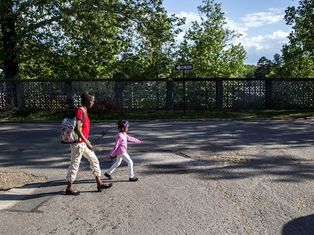
Study finds little path from poverty in Buncombe County
By Beth Walton
Asheville Citizen-Times
Published: May 22, 2015
ASHEVILLE – While poking at a few piano keys at Pisgah View Apartments, 6-year-old Maddison Rogers insists she can grow up to be whatever she wants. For the kindergartner at Hall Fletcher Elementary, that might be a singer, a teacher, a writer, or a mom. Or maybe she'll work at a hospital, or even a hotel. Hotels are where rich people go, she said. If Maddison is an author, she can read her books to an audience in the hotel lobby. If she's a singer, the lounge will be her performance venue.
"Anything I can imagine, I can be," she said, gleefully moving about the colorful learning center run by Children's First/Communities in Schools, a nonprofit working to move families out of poverty. "I might be the president's wife. Or, maybe I'll be the president. Can we both be presidents together?" she asked with wide eyes and an even wider grin.
Maddison's plans fit the kind of narrative Americans love to hear. No matter someone's station in life, with the right education, with a positive attitude and hard work, a brighter future lies ahead. But in Buncombe County, researchers have found the odds are severely stacked against children like Maddison, who lives in one of the city's poorest neighborhoods.
Barriers to upward mobility are entrenched in Buncombe more so than any other Western North Carolina county — and even more than most of North Carolina and the rest of the nation, according to a 2015 Harvard study now getting national attention. Researchers spent 16 years on the project, producing "The Impacts of Neighborhoods on Intergenerational Mobility." By using de-identified tax records, the authors were able to look beyond the aggregate and set up a controlled experiment tracking individual children. ...Click here to read the full article text.
By Beth Walton
Asheville Citizen-Times
Published: May 22, 2015
ASHEVILLE – While poking at a few piano keys at Pisgah View Apartments, 6-year-old Maddison Rogers insists she can grow up to be whatever she wants. For the kindergartner at Hall Fletcher Elementary, that might be a singer, a teacher, a writer, or a mom. Or maybe she'll work at a hospital, or even a hotel. Hotels are where rich people go, she said. If Maddison is an author, she can read her books to an audience in the hotel lobby. If she's a singer, the lounge will be her performance venue.
"Anything I can imagine, I can be," she said, gleefully moving about the colorful learning center run by Children's First/Communities in Schools, a nonprofit working to move families out of poverty. "I might be the president's wife. Or, maybe I'll be the president. Can we both be presidents together?" she asked with wide eyes and an even wider grin.
Maddison's plans fit the kind of narrative Americans love to hear. No matter someone's station in life, with the right education, with a positive attitude and hard work, a brighter future lies ahead. But in Buncombe County, researchers have found the odds are severely stacked against children like Maddison, who lives in one of the city's poorest neighborhoods.
Barriers to upward mobility are entrenched in Buncombe more so than any other Western North Carolina county — and even more than most of North Carolina and the rest of the nation, according to a 2015 Harvard study now getting national attention. Researchers spent 16 years on the project, producing "The Impacts of Neighborhoods on Intergenerational Mobility." By using de-identified tax records, the authors were able to look beyond the aggregate and set up a controlled experiment tracking individual children. ...Click here to read the full article text.
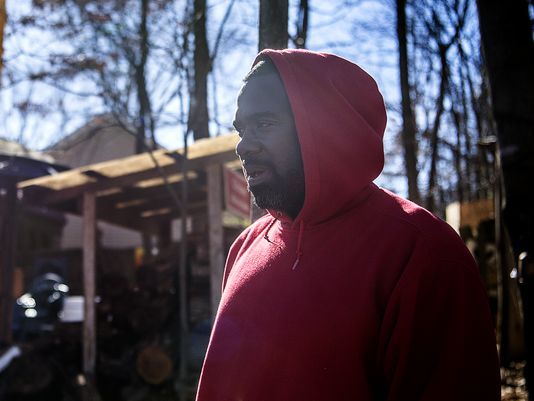
Buncombe looks to curb crime by investing in people
By Beth Walton
Asheville Citizen-Times
Published: Feb. 17, 2017
ASHEVILLE - For Stephen Smith, the gift of a lawnmower gave him the edge he needed to make it as black man coming out of prison in a city troubled by racial and economic disparity.
He started a commercial and residential landscaping business. He began contracting with local government. He soon had enough capital to employ neighborhood teens looking to move out of poverty. His goal now is to make sure their future is different than his past.
Smith and other neighborhood activists are part of a driving force behind two initiatives being pushed by Buncombe County Health and Human Services and members of the Board of Commissioners. The goal is to build racial and economic equity and keep people in the workforce and out of the criminal justice system.
Commissioners will vote Tuesday on measures that would invest in social programs the Department of Health and Human Services says have the potential revitalize some of the county’s poorest communities.
“We make large economic development investments to bring businesses into our community, and those are smart investments,” said Mandy Stone, assistant county manager and Health and Human Services director. “It’s equally smart to invest in the talents and skills we have within our community.” ...Click here to read the full article text.
By Beth Walton
Asheville Citizen-Times
Published: Feb. 17, 2017
ASHEVILLE - For Stephen Smith, the gift of a lawnmower gave him the edge he needed to make it as black man coming out of prison in a city troubled by racial and economic disparity.
He started a commercial and residential landscaping business. He began contracting with local government. He soon had enough capital to employ neighborhood teens looking to move out of poverty. His goal now is to make sure their future is different than his past.
Smith and other neighborhood activists are part of a driving force behind two initiatives being pushed by Buncombe County Health and Human Services and members of the Board of Commissioners. The goal is to build racial and economic equity and keep people in the workforce and out of the criminal justice system.
Commissioners will vote Tuesday on measures that would invest in social programs the Department of Health and Human Services says have the potential revitalize some of the county’s poorest communities.
“We make large economic development investments to bring businesses into our community, and those are smart investments,” said Mandy Stone, assistant county manager and Health and Human Services director. “It’s equally smart to invest in the talents and skills we have within our community.” ...Click here to read the full article text.
Proudly powered by Weebly









